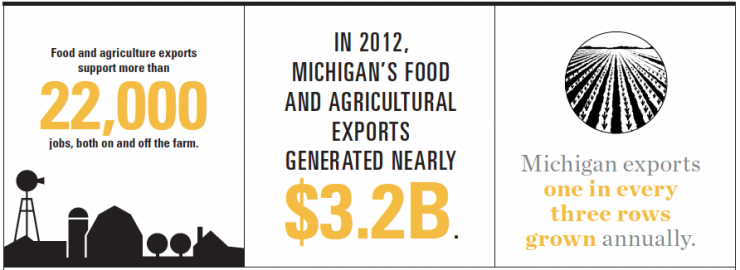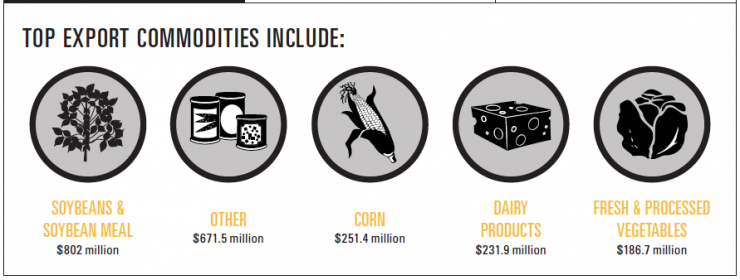Home > Michigan > Michigan Crops & Livestock > Expanding Michigan Agriculture Exports
Expanding Michigan Agriculture Exports
In partnership with: Michigan Department of Agriculture & Rural Development

When it comes to the export business, Michigan’s food and agriculture industry is in the right place at the right time.
That’s the assessment of Jamie Zmitko-Somers, international marketing program manager for the Michigan Department of Agriculture and Rural Development (MDARD). She points not only to a steady growth in food and agriculture exports in recent years, but also to the state’s initiative to increase its presence even more in the international market.
“We exported just under $3.2 billion in 2012,” Zmitko-Somers says, “and we’ve seen continued growth year after year.”
“We have an emphasis from Governor Snyder and a goal to double our agricultural exports within five years,” she says.
Exports of food and agricultural products have a tremendous impact on Michigan’s overall economy. More than one-third of agricultural products grown in the state are exported each year, and the industry accounts for nearly 22,000 jobs.
The state has 24 ports on the lakes and waterways that surround it, including the largest at Detroit/Wayne County Port Authority. It’s a major port for products being shipped from the Midwest and from southwest Ontario.
Top countries that import from Michigan are Canada, Mexico, Japan, South Korea and China. Leading agricultural commodities exported from the state are soybeans, corn, wheat, dairy products and fruit.

Food Export Help
Much of the reason for the success in the state’s food and agricultural exports can be traced to the various initiatives and services of MDARD’s International Marketing Program. The program’s goal is to assist Michigan food and agriculture businesses in developing trade opportunities for moving their products overseas.
To accomplish this, the program works in partnership with the Food Export Association of the Midwest,a nonprofit organization that is a cooperative effort among the 12 Midwest states and the U.S. Department of Agriculture’s Foreign Agricultural Service.
“Our goal is to assist primarily the small- to medium-sized companies to export their food and agricultural products,” Zmitko-Somers says. “We do that in a number of ways.”
‘Big Fans’
The assistance has been beneficial for several companies.
“We’re big fans of what the Food Export program offers,” says Brian Klumpp, director of business development for Cherry Central in Traverse City.
“They very often have a presence at the big trade shows we’re involved in. A bunch of international buyers come to these shows from all over the world, and what the Food Export program group has done has vetted these people so we know they’re good companies. We have also participated in the trade mission trips they do.”

Cherry Central, in business since 1973 and an exporter to countries in Western Europe since then, produces dried fruits, frozen fruits, fruit juices, applesauce and various ingredients.
“Our export business just continues to grow,” Klumpp says. “Around 10 percent of our business is export.”
Support from MDARD has been “invaluable” in Graceland Fruit’s export business, says Brent Bradley, the Frankfort company’s vice president of sales and marketing.
“As a small company in Northern Michigan, financially, we simply would not have been able to afford to participate in the trade shows and trade missions throughout the world without MDARD’s support,” he says. “These activities have helped us meet new sales agents and distributors throughout the world.”
Graceland Fruit, founded in 1973, is one of the world’s largest providers of infused dried fruits. The company first began exporting in 1995 to Japan, and today exports account for about 40 percent of its dried fruit sales.
“International markets are just as important as our domestic market,” Bradley says.



